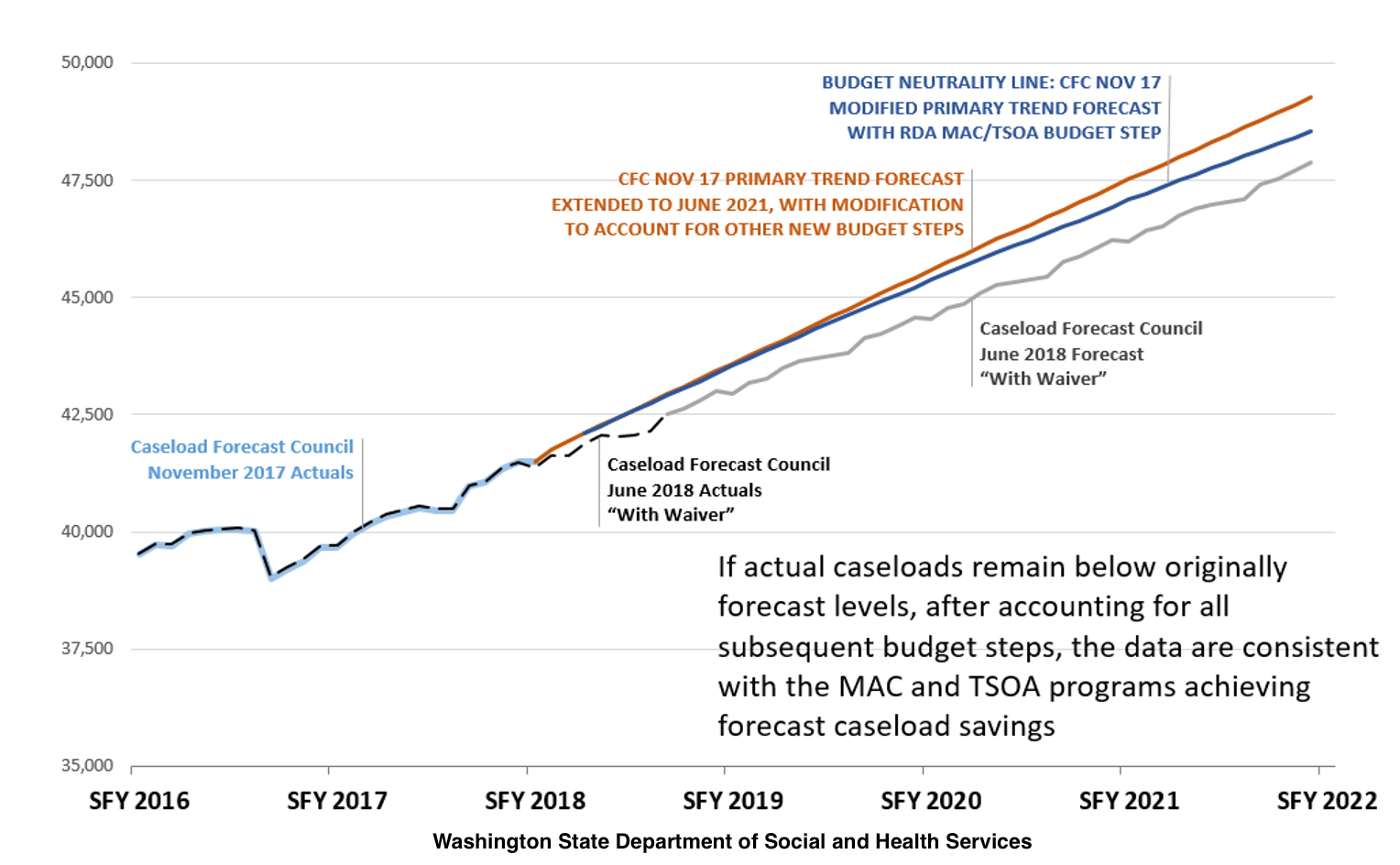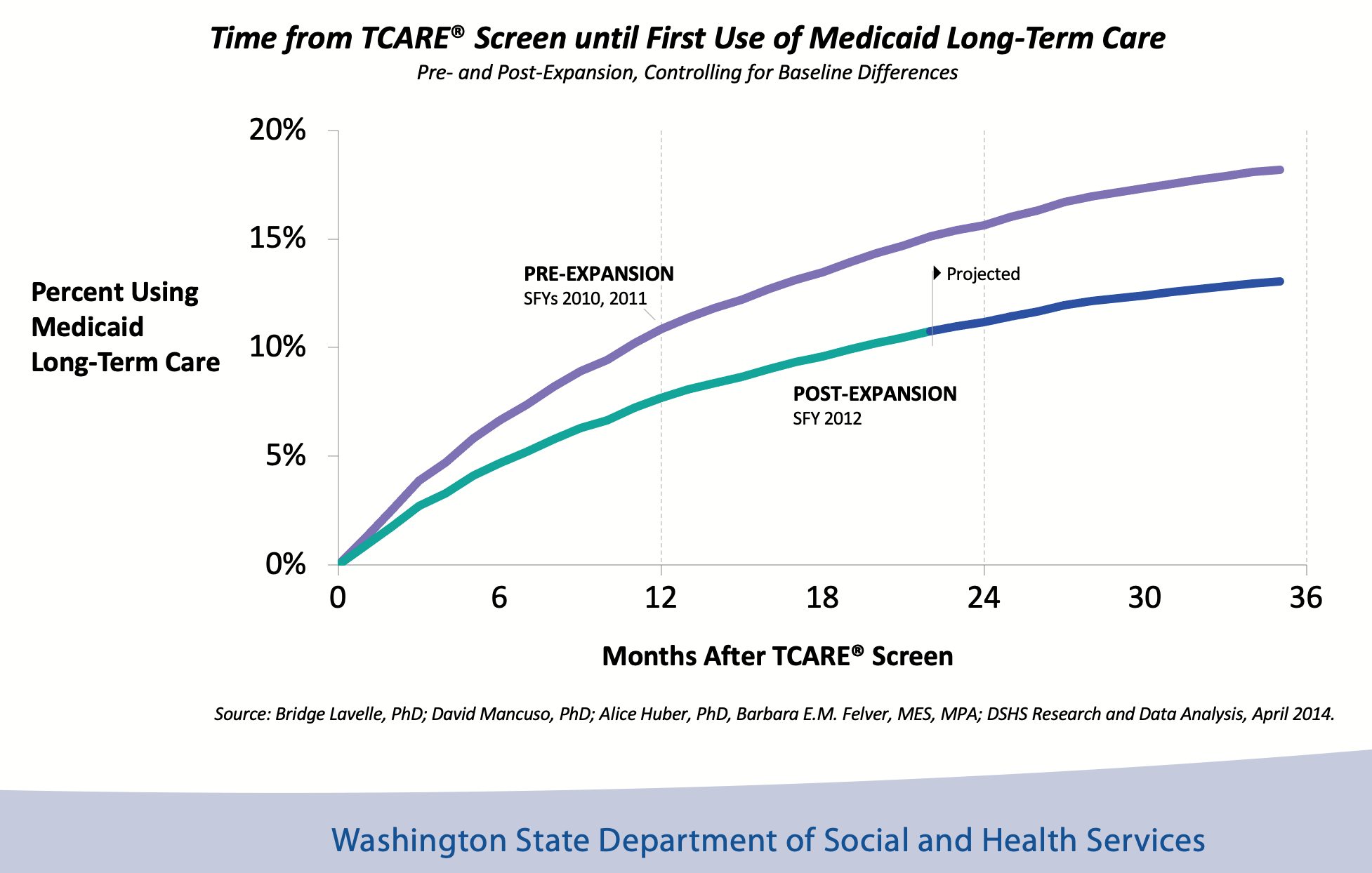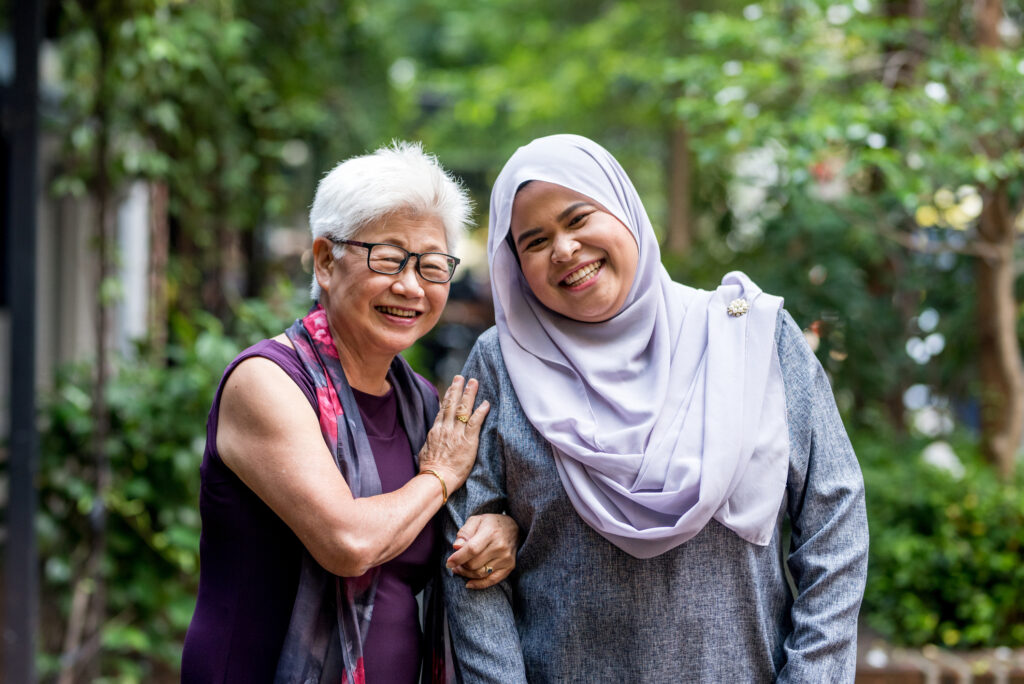Washington has been at the forefront of providing supports to family caregivers, in large part, because state policymakers have been able to demonstrate cost savings and improved quality of life. Washingtons Medicaid Transformation Project proactively supports caregivers of individuals likely to spend down to Medicaid long term services and supports (LTSS). It was designed after Washingtons Family Caregiver Support Program, (FCSP) which assesses caregivers and provides training, respite, and other resources. Robust data collected from these programs demonstrate that Washingtons investments in family caregivers have ultimately contained costs while improving the wellbeing of caregivers and individuals receiving care.
Proven Return on Investment
Washingtons comprehensive Medicaid 1115 waiver program, the Medicaid Transformation Project, has shown a return on investment since its inception in 2017. This waiver has two caregiver support programs: Medicaid Alternative Care (MAC), which serves caregivers of Medicaid-eligible individuals not using Medicaid LTSS, and Tailored Services for Older Adults (TSOA), which supports individuals and caregivers of individuals who are not yet eligible for Medicaid or are choosing to not participate in Medicaid, but likely to eventually need Medicaid LTSS. TSOA and MAC both offer similar benefits for caregivers, including:
- Caregiver assistance with household tasks, respite, home-delivered meals, and minor home repairs
- Training and education
- Specialized medical equipment and supplies
- Health maintenance and therapy supports, such as adult day centers and counseling
The dollar value of the benefits depends on the caregivers assessment. Caregivers are eligible for benefits if they receive a screening with TCARE, an evidence-based tool for assessing a caregivers own needs. Caregivers can receive up to $4,362 over a six-month period depending on their assessed level of need and care plan. Eligibility is determined primarily by age, income, and assessment, with more flexibility with income and asset limits than traditional Medicaid. Perhaps due to these flexibilities, more individuals and caregiver/recipient pairs have enrolled in TSOA than MAC. Enrollment in the program has been lower than anticipated, in part due to challenges reaching people who do not self-identify as caregivers.
| Eligibility for Medicaid Transformation Project LTSS Initiatives | |
| Medicaid Alternative Care (MAC) | Tailored Supports for Older Adults (TSOA) |
|
|
Washington analysts determine cost effectiveness with a synthetic estimate projection, a method of statistical analysis that compares actual expenditures with projected expenditures if no program had been implemented. Though the waiver is still in progress, data from the first few years show that the program is succeeding in delaying Medicaid LTSS and preventing hospitalizations. Furthermore, survey results find high levels of satisfaction among caregivers and recipients. Washingtons evaluation is largely based on data from TCARE family caregiver assessments combined with data on emergency department visits, inpatient admissions, 30-day readmission rate, nursing home admission rate, and mortality rate.

Prior to the initiation of the Medicaid Transformation Project, Washington used data to demonstrate the cost-effectiveness of expanding its Family Caregiver Support Program (FCSP) in 2012. Under Washingtons FCSP, interested caregivers receive a TCARE screening. Subsequently, eligible caregivers receive support in finding local resources, training on caregiving topics, help with securing respite, and advice and support on specific challenges. This assessment strategy produces a range of data on caregivers and recipients of care and allows the state to establish a baseline from which to study the impact of the program. In an analysis of the FCSP expansion, Washington found that care recipients whose caregivers were screened following FCSP expansion were 20 percent less likely to enroll in Medicaid LTSS in the year post-screening, controlling for other factors. These results identified a return on investment using baseline and implementation data, demonstrating the value of the states investment in caregivers and serving as a precursor to the Medicaid Transformation Project waiver.

Multi-Faceted Approach to Support Caregivers and Reduce Medicaid Costs
Washingtons efforts on caregiver supports are multi-faceted to delay the need for Medicaid services. Both Washingtons FCSP expansion and its Medicaid waiver place an emphasis on identifying caregivers in need of support before more formal LTSS are needed and connecting them with resources. These initiatives align with other efforts Washington has taken to support caregivers and older residents, including the states Paid Family Leave program and its first-in-the-nation public long-term care insurance program. The combination of these supports, emboldened by robust data demonstrating their effectiveness, forms a cohesive caregiver support strategy that allows Washington to provide LTSS care while spending less per resident on Medicaid LTSS than the national average.
Acknowledgement: Thank you to Susan Engels, Office Chief, Home and Community Services, Washington State Department of Social and Health Services, for presenting much of this information to NASHPs State Medicaid Policy Institute on Family Caregiving on June 16, 2021. This blog is part of NASHPs RAISE Act Family Caregiver Resource and Dissemination Center and is supported by The John A. Hartford Foundation.



